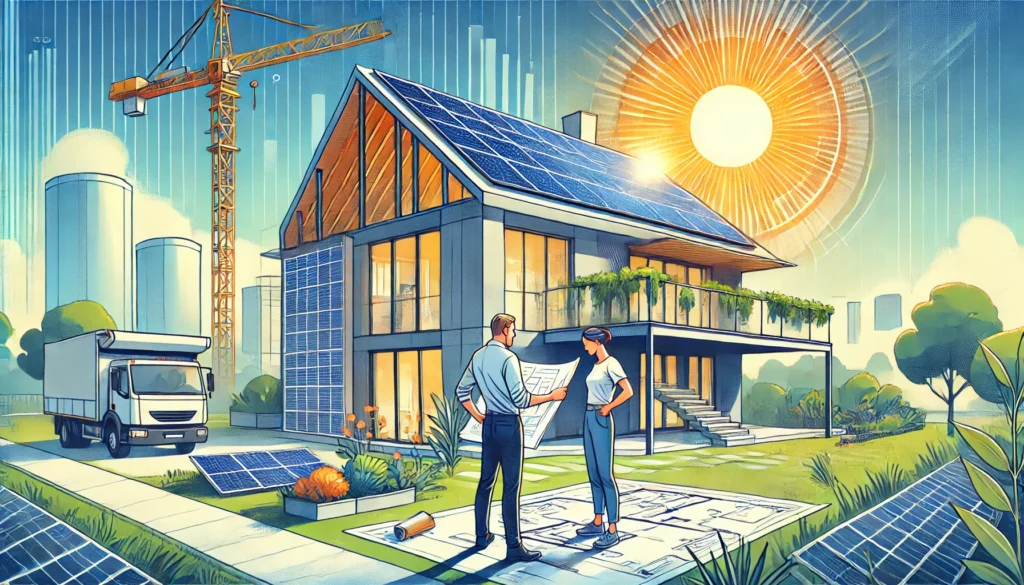Solar-Ready Building Codes Are on the Rise: What Homeowners Need to Know
As the U.S. transitions toward cleaner and more sustainable energy solutions, many states and municipalities are implementing solar-ready building codes to encourage or even mandate solar installations on new residential constructions. These evolving regulations are designed to make homes more energy-efficient, reduce reliance on fossil fuels, and lower long-term energy costs for homeowners.
If you’re planning to build a new home, renovate an existing one, or even move to a solar-friendly state, understanding these solar-ready codes can help you stay ahead of the curve. Let’s break down what these policies mean and how they could impact homeowners and builders alike.
- What Are Solar-Ready Building Codes?
Solar-ready building codes are regulations that require or encourage new residential buildings to be designed in a way that makes installing solar panels easier, either at the time of construction or in the future.
These codes typically include:
✅ Roof design standards to accommodate solar panels efficiently.
✅ Pre-wiring and conduit placement to simplify future solar installations.
✅ Structural requirements to ensure roofs can support the weight of a solar system.
✅ Orientation and shading considerations to maximize solar energy generation.
While some jurisdictions require solar panel installations on all new homes, others focus on solar-ready designs, ensuring homes can be easily upgraded with solar at a later date.
- Where Are Solar-Ready Codes Being Implemented?
Several states and cities have already adopted solar-friendly building codes, while others are considering similar measures.
🔹 California – The first state to require solar panels on all new homes starting in 2020. This law has set the standard for other states considering similar mandates.
🔹 Arizona & Colorado – Some cities have solar-ready policies requiring new homes to be built with rooftop space and pre-installed conduits for future solar panel integration.
🔹 Massachusetts – Exploring updates to state building codes that would promote solar-ready designs for new residential developments.
🔹 Illinois & New York – Working on legislative efforts to encourage solar installations on new construction and offer incentives for builders who comply.
As solar energy adoption grows, more states and municipalities are expected to follow suit, making solar a more common feature in newly built homes.
- How Do These Codes Impact Homeowners?
For homeowners, solar-ready building codes offer several benefits:
✅ Lower Future Installation Costs – Homes built with solar-ready infrastructure significantly reduce the cost of adding solar panels later, saving homeowners thousands of dollars in retrofitting expenses.
✅ Increased Property Value – Solar-equipped and solar-ready homes tend to sell for higher prices and attract energy-conscious buyers.
✅ Long-Term Energy Savings – Whether solar panels are installed immediately or later, solar-ready homes ensure long-term energy efficiency and lower electricity bills.
✅ Environmental Benefits – By making solar adoption easier, these policies contribute to reducing carbon footprints and promoting sustainability.
For homeowners considering building a new home or renovating, ensuring compliance with solar-ready standards adds long-term value and energy savings to their investment.
- What Do These Policies Mean for Builders and Developers?
For builders and developers, solar-ready codes represent both challenges and opportunities.
💡 Compliance with new regulations – Builders must adapt designs to accommodate solar panels, including roof space, wiring, and orientation adjustments.
💡 Competitive Advantage – Offering solar-ready homes can attract eco-conscious buyers and boost sales in an increasingly energy-focused market.
💡 Access to Incentives – Some states provide tax credits or rebates to builders who meet solar-ready criteria, reducing upfront costs.
💡 Lower Operating Costs for Homebuyers – Homes with built-in solar infrastructure are more appealing to buyers looking for long-term savings on energy bills.
As more states implement solar-friendly regulations, builders who embrace these changes early will have a competitive edge in the housing market.
- Should Homeowners Consider Retrofitting Their Homes?
Even if your home wasn’t built under a solar-ready code, it’s still possible to upgrade it to be more solar-friendly.
🔹 Roof Reinforcement: If your roof isn’t structurally prepared for solar panels, consider reinforcing it to handle the extra weight.
🔹 Wiring & Conduits: Installing pre-wiring for solar panels makes it easier and cheaper to add a system in the future.
🔹 Optimal Orientation: If you’re planning a roof replacement, consider adjusting its angle to maximize solar panel efficiency.
🔹 Battery Storage Considerations: Many new solar-ready codes include battery storage provisions, allowing homes to store excess energy for later use.
Making these upgrades now can reduce costs and improve energy efficiency when you decide to go solar.
- Why Now Is the Best Time to Plan for Solar
With solar energy adoption accelerating nationwide, solar-ready homes are becoming the new standard. Whether you’re:
🏡 Building a new home – Ensure it’s designed with solar-friendly features to save money and increase efficiency.
🔄 Renovating an existing home – Consider upgrading your roof, wiring, or structure to make future solar installation easier.
💡 Thinking about going solar now – Take advantage of federal tax credits and local incentives before policies change.
Solar energy is no longer a futuristic concept—it’s a smart, cost-saving investment that homeowners can benefit from today.
Final Thoughts: Embracing the Future of Solar-Ready Homes
With solar-ready building codes gaining momentum, homeowners and builders alike should prepare for the future of energy-efficient living. Whether mandated or encouraged, these policies make solar power more accessible, affordable, and beneficial in the long run.
By understanding these trends, homeowners can make informed decisions about new construction, renovations, and the timing of their solar panel installation.
🌞 Are you ready to explore solar energy for your home? Contact us today to learn how we can help you install a solar-ready system or upgrade your existing home for future savings!
Ready to make the switch?
Contact us today to learn how solar panels can help you save more in the long run!
Complete Residential Solar Panels and Systems. Serving Texas, Oklahoma, Kansas, Missouri, Utah, Florida & Ohio
Get a Free Quote Now
